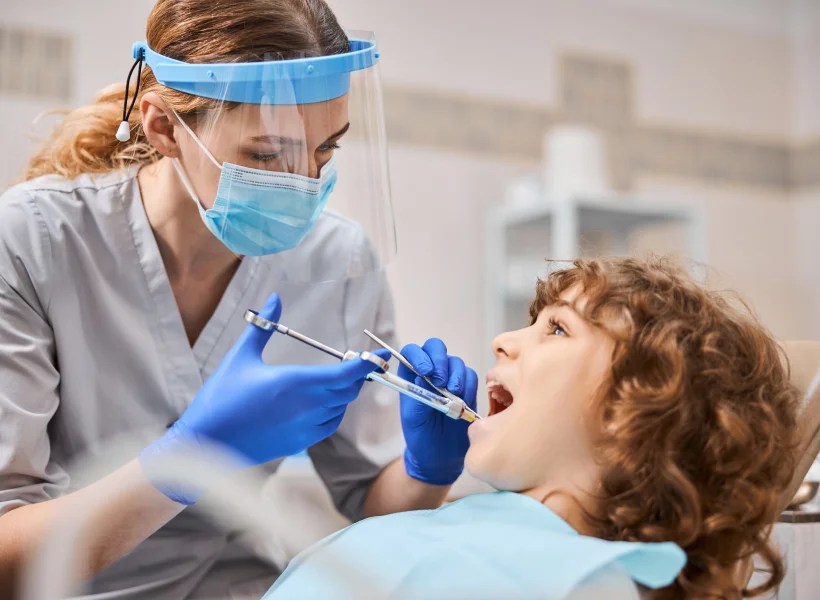Parents, we must make sure that the wellbeing of children is the highest priority, but dental health is often a neglected concern until there’s an issue. The first dental check-up isn’t just about examining for cavities. they lay the groundwork for the rest of your dental hygiene habits, aiding prevent serious dental problems and aid children in developing an comfortable rapport with the dentist.
The blog below will go over the reasons for why going to the dentist sooner is essential, as well as what you should expect at these appointments and also ways to make dental visits be pleasant.
When Should Children Have Their First Dental Visit?
In conformity with the American Academy of Pediatric Dentistry (AAPD) the child must visit the dentist prior their first birthday or within six months of the moment the first tooth becomes apparent.
Why do we have to wait so long?
- Early visits help detect developmental issues.
- Parents get advice on how to keep the health of their mouths.
- Children are accustomed to dental settings, which decreases anxiety and fear.
The earlier you seek dental care, the better. can help ensure that issues are dealt with before they get more dangerous.

Benefits of Early Dental Visits
1. Prevents Tooth Decay and Cavities
Baby teeth though temporary, are essential for chewing, speaking and to guide the permanent tooth. Visits to the dentist before age 6:
- Aid dentists in identifying early warning signs of tooth decay early warning signs.
- It is important to include preventive treatment, like fluoride, or sealing dental fillings.
- Parents need to be taught to restrict their consumption of alcohol and sweets, which can cause cavities.
The prevention of tooth decay minimizes the chances of a painful tooth cavity and complex dental procedures later on.
2. Encourages Good Oral Hygiene Habits
Dentists can offer guidance for patients at all stages of life regarding brushing, flossing, and ensuring proper oral hygiene. Initial visits:
- Help parents learn effective techniques.
- Help children see flossing and brushing as a fun routine.
- Create habits that will last into adulthood.
3. Early Detection of Developmental Issues
Dental experts monitor the development of jaws, the alignment of teeth and bite and align. Early visits may be revealing:
- Malocclusion (misaligned bite)
- Troubles related to jaw or facial expansion
- Pacifier-related or thumb-sucking-related dental issues
In the event that you take care of these issues early stages will help reduce the necessity of more comprehensive orthodontic treatment to come in the near future.
4. Reduces Dental Anxiety
Dental anxiety is a common phenomenon often rooted in the first contact in the early years of childhood. Initial visits to the dentist:
- Children need to be introduced to the equipment and methods.
- Promote a positive, stress-free dental experience.
- reduce anxiety which makes subsequent visits less stress-inducing and less traumatizing.
5. Builds Parent Awareness
Dental visits are educational for parents too. Dentists can give assistance regarding:
- Supplements to nutrition for healthy teeth and gums
- Properly using fluoride and products to maintain oral hygiene
- Dental problems to look out for during dental visits
A knowledgeable parent is more prepared to help the oral health of their children within the house.

What to Expect During Your Child’s Early Dental Visits
The first visit to the dentist is typically straightforward and focuses in prevention as well as education. The most commonly used steps are:
- Visual Examination: Examining the teeth, the tongue, gums, as well as bite.
- Cleaning (if needed) Cleaning plaques and showing the brushing technique.
- Enhances the strength of your enamel with fluoride treatment to avoid cavities.
- Parent Guidance: Tips regarding diet, brushing and dental care.
Tips The majority of pediatric dentists employ engaging methods and positive reinforcement. This can make their visits enjoyable for kids.
Tips for Making Early Dental Visits Smooth
- Start at home with videos or books on dentistry to aid your kid become familiar with the concept.
- Avoid negative words like “pain” or “hurt” could cause anxiety. Concentrate upon “cleaning” and “checking. “
- Be positive and calm Children often mirror their feelings. Being calm and confident, with an optimistic mindset can make to feel more secure.
- Choose an pediatric dentist A dentist who is specially educated to handle children will make visits more entertaining and enjoyable.
The Long-Term Impact of Early Dental Care
Children who go to dental appointments earlier are less likely to suffer from:
- Dentist extractions, serious decay, and cavities
- An orthodontic delay
- The fear and anxiety of going to going to the dentist
Furthermore the kids are educated that proper dental hygiene is an essential aspect of their overall health and makes children more likely to maintain the same amount of dental hygiene throughout their lives.
Conclusion
The dental visits that children receive from an early age don’t just mean routine checks, they’re an investments in your child’s overall health and self-confidence and an exciting future smile. If you begin dental care before problems develop, you’ll be able avoid the formation of cavities, detect issues in the development of your child early, and establish long-lasting dental hygiene habits.
Parents play an essential role in selecting the appropriate pediatric dentist, as well as helping with regular visits and promoting healthy oral habits within the family. A healthy smile from a young age will help set the stage for a lifetime of teeth health.
FAQs
1. What age is the right age to let my child go to the dentist at first?
When they reach their first birthday (or six months later) after their first tooth’s appearance.
2. What is the main reason that baby teeth are so vital in the event they be lost?
They assist in chewing, speaking and assist in guiding permanent teeth to the correct position.
3. What is the minimum frequency recommended for children to see dental appointments?
Six months every six months or as instructed by the dentist for children.
4. Can dental visits prevent cavities?
Sure, prevention therapies like fluoride treatments sealing and cleaning treatments will significantly reduce the chance of developing cavities.
5. What should I do if my child seems scared of visiting Dentist?
Start early, keep an optimistic mindset and choose an expert dentist for children who is proficient in working with children.



